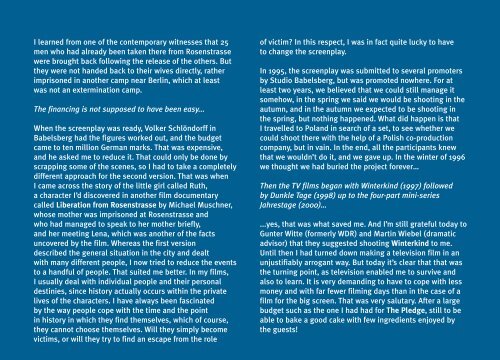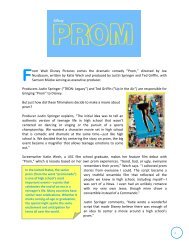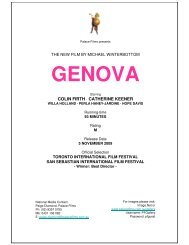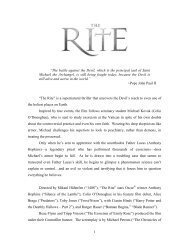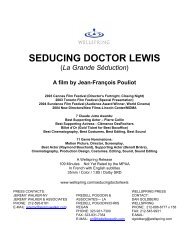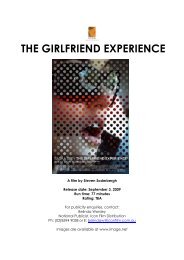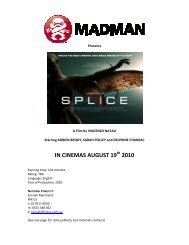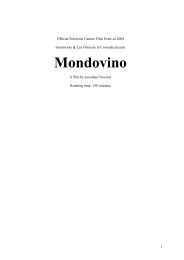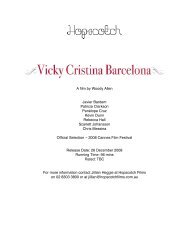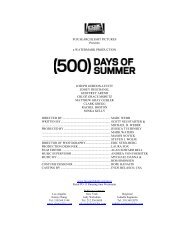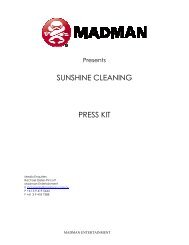ROSENSTRASSE
ROSENSTRASSE
ROSENSTRASSE
Create successful ePaper yourself
Turn your PDF publications into a flip-book with our unique Google optimized e-Paper software.
I learned from one of the contemporary witnesses that 25<br />
men who had already been taken there from Rosenstrasse<br />
were brought back following the release of the others. But<br />
they were not handed back to their wives directly, rather<br />
imprisoned in another camp near Berlin, which at least<br />
was not an extermination camp.<br />
The financing is not supposed to have been easy...<br />
When the screenplay was ready, Volker Schlöndorff in<br />
Babelsberg had the figures worked out, and the budget<br />
came to ten million German marks. That was expensive,<br />
and he asked me to reduce it. That could only be done by<br />
scrapping some of the scenes, so I had to take a completely<br />
different approach for the second version. That was when<br />
I came across the story of the little girl called Ruth,<br />
a character I’d discovered in another film documentary<br />
called Liberation from Rosenstrasse by Michael Muschner,<br />
whose mother was imprisoned at Rosenstrasse and<br />
who had managed to speak to her mother briefly,<br />
and her meeting Lena, which was another of the facts<br />
uncovered by the film. Whereas the first version<br />
described the general situation in the city and dealt<br />
with many different people, I now tried to reduce the events<br />
to a handful of people. That suited me better. In my films,<br />
I usually deal with individual people and their personal<br />
destinies, since history actually occurs within the private<br />
lives of the characters. I have always been fascinated<br />
by the way people cope with the time and the point<br />
in history in which they find themselves, which of course,<br />
they cannot choose themselves. Will they simply become<br />
victims, or will they try to find an escape from the role<br />
of victim? In this respect, I was in fact quite lucky to have<br />
to change the screenplay.<br />
In 1995, the screenplay was submitted to several promoters<br />
by Studio Babelsberg, but was promoted nowhere. For at<br />
least two years, we believed that we could still manage it<br />
somehow, in the spring we said we would be shooting in the<br />
autumn, and in the autumn we expected to be shooting in<br />
the spring, but nothing happened. What did happen is that<br />
I travelled to Poland in search of a set, to see whether we<br />
could shoot there with the help of a Polish co-production<br />
company, but in vain. In the end, all the participants knew<br />
that we wouldn’t do it, and we gave up. In the winter of 1996<br />
we thought we had buried the project forever…<br />
Then the TV films began with Winterkind (1997) followed<br />
by Dunkle Tage (1998) up to the four-part mini-series<br />
Jahrestage (2000)…<br />
...yes, that was what saved me. And I’m still grateful today to<br />
Gunter Witte (formerly WDR) and Martin Wiebel (dramatic<br />
advisor) that they suggested shooting Winterkind to me.<br />
Until then I had turned down making a television film in an<br />
unjustifiably arrogant way. But today it’s clear that that was<br />
the turning point, as television enabled me to survive and<br />
also to learn. It is very demanding to have to cope with less<br />
money and with far fewer filming days than in the case of a<br />
film for the big screen. That was very salutary. After a large<br />
budget such as the one I had had for The Pledge, still to be<br />
able to bake a good cake with few ingredients enjoyed by<br />
the guests!


